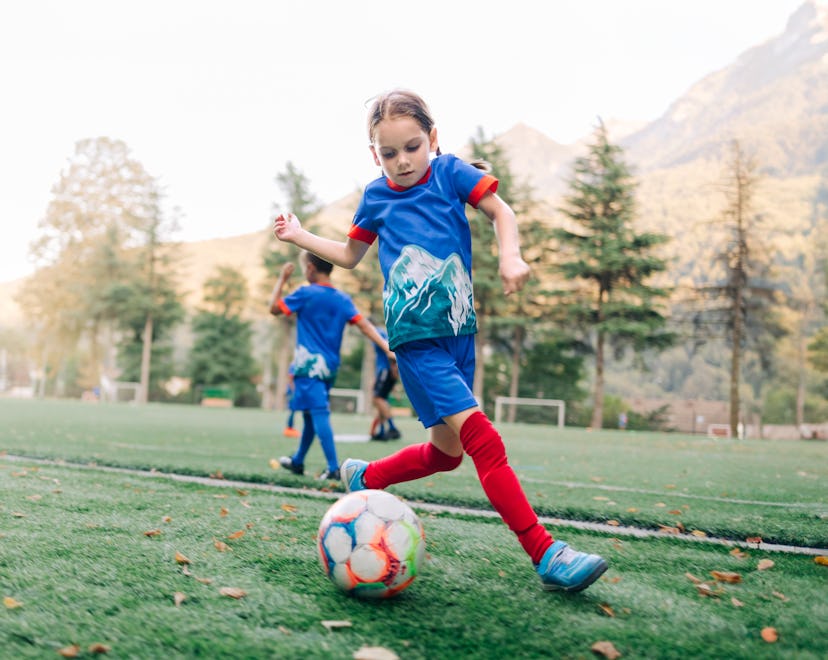Parenting

I Know Nothing About Soccer. I'm Still Coaching My Daughter's Team.
I don’t know much about soccer, but I do know the power of feeling good & strong in your body. And I know I want that for these girls.
I’m coaching my eight year old daughter’s soccer team. You might be thinking, “What a kind thing to do!” but let me stop you right there: I am coaching because I am an absolute control freak who loves to be in charge. There is no generosity here; this is 100% Kristy from The Babysitters Club energy. There is also gratitude, as a mom with multiple sclerosis, I did not know if I’d be well enough to coach my kid’s sports teams. My health currently lets me run the field with my daughter and her teammates, and any side effects I have certainly don’t get in the way of me yelling some version of, “YOU ARE AN OLYMPIAN,” at a small child any time the ball comes near the goal.
Let me be clear, do I know a lot about soccer? No ma’am. (I played one year as a child, but cannot remember it through the haze of Capri Suns and childhood trauma). Do I know a lot about other sports? Also no. the sport I know the most about is soccer, and that is, as I said, nothing. But what I lack in skills I make up for in enthusiasm and ability to shout out a child’s name and specific athletic compliment. Is this coaching? No. Have we won some games, though? Yes.
Because we live in Seattle, a place that loves darkness, our team name is The Crows. I have the girls yell “CAW, CAW!” as they take the field, their arms waving like wings, friendship bracelets flapping in the wind. At the end of each game, I award a player Crow of the Game. Despite the fact that at the first game, the parents watching from the sidelines thought I was handing out a dead bird, they are stuffed animals and the girls love them.
I want her to know the joy of these movements before she settles into the joy of the right lipstick and outfit for a Friday night.
I decided to coach because I know what’s on the horizon for my daughter. Soon her body will be a container for more than just handstands and goalie kicks, and I want her to know the joy of these movements before she settles into the joy of the right lipstick and outfit for a Friday night. I want the girls on my teams to be given nicknames about how powerful they are instead of how beautiful they are. Current Crow nicknames include: the Brick Wall, Sparky and Killer. (Killer is the quietest kid on the team, and adores her nickname.)
I know how sport can completely shift the relationship one has with their body. After my diagnosis with multiple sclerosis at the age of 20, I immediately joined a gym. I decided I was “going to use my body while I still [could],” and found that focusing on my squat weight helped me when I worried about the future loss of my mobility. The gym, and movement, became a way to be in my body, to celebrate it, at a time when my body felt very scary.
This awareness — that exercise can ground me in my body, even when I don’t understand what my body is doing — is what I hope to pass onto my daughter, especially as she’s on the brink of puberty and growing up. Because while puberty is not the same as being diagnosed with a chronic illness (though when you’re an 11-year-old girl, sometimes it might feel that way), it shares the quality of the threshold. My daughter does not know what’s coming, and she is scared and, I hope, excited for what’s to come. I want sports to be a lifeline for her in the way it has been for me, for the repetition and difficulty of running the field to be a way to both anchor in her body and forget about her body at the same time.
Because honestly, what I care about isn’t soccer. It’s that she’s given the chance to develop her own relationship with her body, with what makes her feel good and powerful, before society inserts itself into that relationship. I want to hold onto my influence with her a little longer, just like she and Killer asked to hold onto my hands as we ran our final laps at last night’s practice.
As I stormed the field, running 20 years after my diagnosis, with ten 9-year-old-girls as the sun went down, CAW CAW-ing loudly, I thought maybe this is actually what winning looks like.